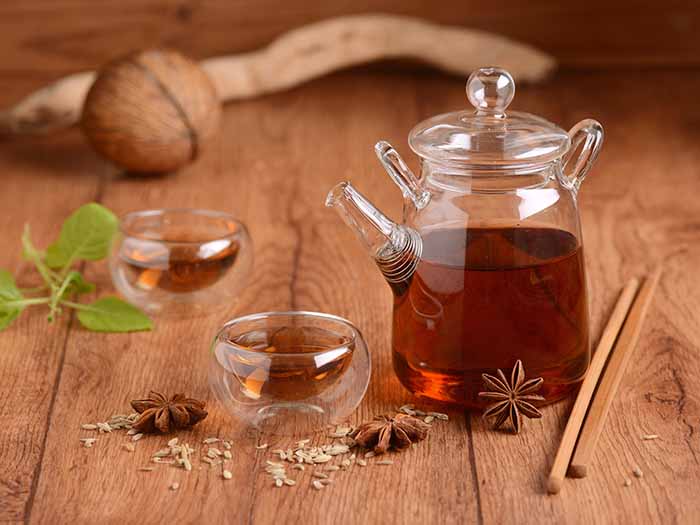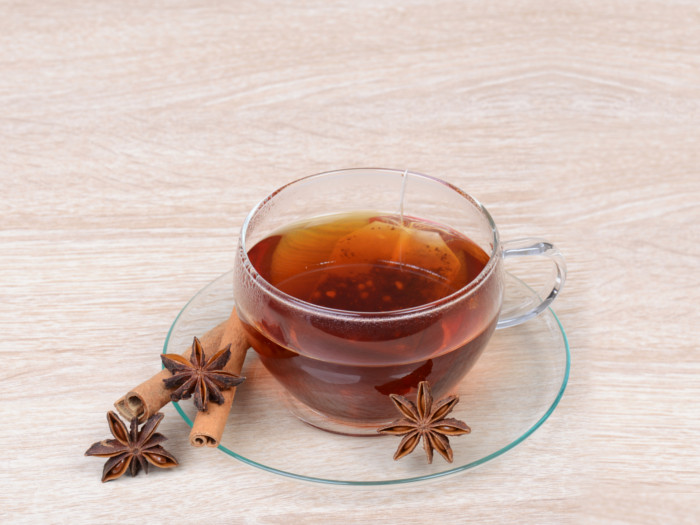Anise tea is a flavorful and unique tea that can be enjoyed year-round as a nutrient-packed beverage with a number of health benefits.
What is Anise Tea?
Anise tea is an herbal tea prepared with the seeds and leaves of the anise plant, which bears the scientific name Pimpinella anisum. [1]Anise has been cultivated and widely used in the Middle East and the Mediterranean region for thousands of years, both as a culinary ingredient and as an element in natural health practices. As a medicinal tool, anise is most commonly made into a tea, although the essential oil of these seeds is also sought after.
Anise has a very recognizable flavor, similar to licorice, tarragon, and fennel, and while this makes it unappealing for some people, it remains widely popular.
Anise Tea Benefits
The most important health benefits of anise tea may include relieving digestion problems, cough, asthma, and sore throats, boosting immunity, stimulating the appetite, and soothing inflammatory conditions, among others.
May Aid in Digestion
One of the oldest uses of anise tea is as a mild laxative. Drinking this tea when you are feeling a bit blocked up can quickly stimulate the movements in your colon and relieve symptoms of constipation. [2]
May Relieve Inflammation
This tea has a number of active ingredients and possibly anti-inflammatory compounds that make it a soothing and relaxing beverage, both mentally and physically, such as for conditions like arthritis, gout, headaches, and chronic injuries. [3]
May Boost The Immune System
With potential antiviral and antibacterial compounds in these powerful seeds, a cup of this tea makes for an excellent immune system booster, in addition to the various antioxidants found in this beverage. [4]
May Relieve Respiratory Ailments
Functioning as an expectorant and a potentially anti-inflammatory agent, this tea can soothe any irritation in the respiratory tracts, ease your need to cough, and soothe sore throats, while also neutralizing the underlying infection or pathogen causing the symptoms. [5]
May Aid in Lactation
Although using any herbal remedy during pregnancy or breastfeeding should be done carefully, there is good evidence that anise tea can increase milk production and lactation, in case you are struggling to keep your infant fed. [6]

Cute little kettle and tea cup on a table. Photo Credit: Shutterstock
Might Stimulates Appetite
There is a lot of anecdotal evidence that anise tea can help to stimulate the appetite, helping people who are recovering from surgery or illness, as well as those suffering from an eating disorder. [7]
May Help Maintain Hormonal Balance
Anise has certain hormone-mimicking properties and the potential ability to regulate hormone fluctuations in the body, helping everything from sleep issues to PMS. It can even stimulate menstruation. [8]
How to Make Anise Tea?
Making your own anise tea at home is quite simple and only requires dried anise seeds. You can also make decoctions or infusions – weaker brews – with the dried leaves or fresh seeds. Take a look at the recipe below.

Easy-to-Make Star Anise Tea Recipe
Ingredients
- 1 tbsp fresh anise seeds
- 1 cup of water
- 1 tsp honey (optional)
Instructions
- To make star anise tea, crush the anise seeds, which have a star shape, although they do not need to be completely powdered.
- Bring a pot of water to boil and pour over the crushed seeds in a teacup.
- Allow the mixture to steep for 10-12 minutes, allowing as many active ingredients to be released as possible.
- Strain out the anise seeds, if desired, although they should remain at the bottom of the cup. Add a tsp of honey or any other sweetener you prefer and mix well. Serve the tea warm and enjoy!

Notes
Anise Tea Side Effects
There are some side effects, which you should be aware of, before adding anise tea to your diet. These side effects include interactions with other medications, allergic reactions, and potential complications in pregnancy.
- Drug Interactions: Studies have found that anise tea can have negative interactions with certain medications, particularly those for hormonal regulation. Since anise can partially mimic estrogen in the body, it can cause hormonal medication, such as birth control, to be less effective. Other research claims that it can interfere with certain medications.
- Allergic Reactions: There have been a number of reports of allergic reactions to anise tea, including those of the respiratory and gastrointestinal systems. While the reactions are usually mild, and in response to an excessive amount of the tea being drunk, allergies to this herb do exist.

